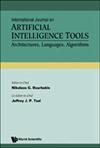基于高阶攻击的论证框架算法研究
IF 1
4区 计算机科学
Q4 COMPUTER SCIENCE, ARTIFICIAL INTELLIGENCE
International Journal on Artificial Intelligence Tools
Pub Date : 2022-11-01
DOI:10.1142/s0218213022600077
引用次数: 1
摘要
与高阶攻击的论证框架相关的计算和决策问题到目前为止还没有得到很多关注。本文是朝着这些问题迈出的一步。首先,它为递归论证框架(Recursive Argumentation Frameworks, RAF)的结构语义提供了相应的标记。其次,研究了与RAF相关的决策问题的复杂性。该研究表明,由于这些丰富的系统提供了更高的表达能力,其复杂性与经典论证框架相同。此外,本文还介绍了一种新的RAF语义,即半稳定语义,以及一种将RAF转换为没有高阶攻击(AF)的论证框架的新过程。最后,定义和研究了AF中已经存在的等价概念(其中包括强连接组件- SCC)的对应新概念,以便将它们用于计算RAF标记语义的算法的未来发展。本文章由计算机程序翻译,如有差异,请以英文原文为准。
Towards Algorithms for Argumentation Frameworks with Higher-order Attacks
Computation and decision problems related to argumentation frameworks with higher-order attacks have not received a lot of attention so far. This paper is a step towards these issues. First, it provides a labelling counterpart for the structure semantics of Recursive Argumentation Frameworks (RAF). Second, it investigates the complexity of decision problems associated with RAF. This investigation shows that, for the higher expressiveness offered by these enriched systems, the complexity is the same as for classical argumentation frameworks. As a side contribution, a new semantics for RAF, the semi-stable semantics, and a new process for translating RAF into Argumentation Frameworks without higher-order attacks (AF), are introduced. Finally, new notions which are the counterparts of equivalent notions already existing for AF (among them, the Strongly Connected Components — SCC) are defined and investigated in order to involve them in the future development of algorithms for computing RAF labelling semantics.
求助全文
通过发布文献求助,成功后即可免费获取论文全文。
去求助
来源期刊

International Journal on Artificial Intelligence Tools
工程技术-计算机:跨学科应用
CiteScore
2.10
自引率
9.10%
发文量
66
审稿时长
8.5 months
期刊介绍:
The International Journal on Artificial Intelligence Tools (IJAIT) provides an interdisciplinary forum in which AI scientists and professionals can share their research results and report new advances on AI tools or tools that use AI. Tools refer to architectures, languages or algorithms, which constitute the means connecting theory with applications. So, IJAIT is a medium for promoting general and/or special purpose tools, which are very important for the evolution of science and manipulation of knowledge. IJAIT can also be used as a test ground for new AI tools.
Topics covered by IJAIT include but are not limited to: AI in Bioinformatics, AI for Service Engineering, AI for Software Engineering, AI for Ubiquitous Computing, AI for Web Intelligence Applications, AI Parallel Processing Tools (hardware/software), AI Programming Languages, AI Tools for CAD and VLSI Analysis/Design/Testing, AI Tools for Computer Vision and Speech Understanding, AI Tools for Multimedia, Cognitive Informatics, Data Mining and Machine Learning Tools, Heuristic and AI Planning Strategies and Tools, Image Understanding, Integrated/Hybrid AI Approaches, Intelligent System Architectures, Knowledge-Based/Expert Systems, Knowledge Management and Processing Tools, Knowledge Representation Languages, Natural Language Understanding, Neural Networks for AI, Object-Oriented Programming for AI, Reasoning and Evolution of Knowledge Bases, Self-Healing and Autonomous Systems, and Software Engineering for AI.
 求助内容:
求助内容: 应助结果提醒方式:
应助结果提醒方式:


